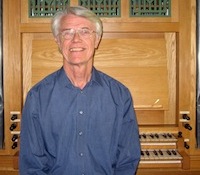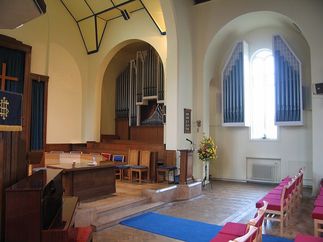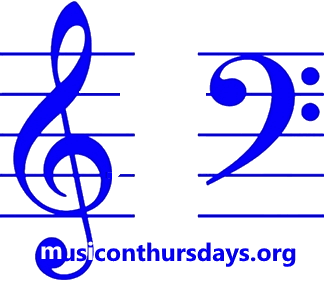Programme
Johann Sebastian Bach (1685-1750)
also attr Johann Ludwig Krebs (1713-1780) pupil of Bach
and to his father Johann Tobias Krebs (1690-1762)
Eight Short Preludes & Fugues
6 G minor BWV 558
8 Bb major BWV 560
2 D minor BWV 554
4 F major BWV 556
7 A minor BWV 559
1 C major BWV 553
3 E minor BWV 555
5 G major BWV 557
Sigfrid Karg-Elert (1877-1933)
from 66 Chorale Improvisations for Organ Op 65 (1906-1908)
Volume 2: Passiontide
No 19 Ich dank dir schon durch deinen Sohn
I thank Thee, O God, through Thy Son
from 3 Impressions for Organ Op 72 (1909)
1 Harmonies du Soir
William Mathias (1934-1992)
Processional Op 96 (1964)
Canzonetta Op 78 No 2 (1978)
Postlude (1962)
Free Concert, with a retiring collection to cover costs. Tea and coffee will be available after the concert.
Anthony Cairns
|
Anthony Cairns has been organist and choirmaster at Christ Church, Leatherhead, since 1965. He has appeared as soloist with the Surrey Philharmonic Orchestra in organ concertos by Handel and Poulenc. He studied piano teaching, cello, and choir training at the Royal College of Music and holds degrees in law (Cambridge, 1961) and music (London, 1977). Anthony became Head of Music at Esher College in 1977, and taught academic music at the Purcell School from 1987 until 1997.
He was conductor of Leatherhead Choral Society from 1991 to 2000. In 2006 he formed the Leatherhead chamber choir AntiphoniA, with whom he has given 17 concerts. In addition to his work at Christ Church, Anthony plays for a monthly evensong at All Saints, Weston Green, Esher, and he sings bass at St Peter’s Church, Vauxhall. |
Anthony put this concert together in a few short weeks after learning that the organist he had booked for September would not be available. His feeling for how a programme works for an audience produced a very enjoyable recital.
|
The Christ Church organ was built by Hill, Norman & Beard in 1970 with 16 stops, using some pipes from previous organs plus some neo-baroque sounds typical of the 1960's and '70's (Chimney Flute and Fifteenth on open-foot voicing, like the Royal Festival Hall organ). In 1995, HNB moved some loud stops from the Great to a new double case in the nave, 6 stops were added, and the tone was refined. In summer 2015 the nave organ was re-voiced to produce a more robust tone. |
Concert at Home
Here are some links to online recordings of works that feature in Anthony Cairns' concert:
Here are some links to online recordings of works that feature in Anthony Cairns' concert:
There is much debate about Anthony Cairns' opening choice of music today. Tor-Andre Kongelf notes:
While originally attributed to Bach, scholars suggest that the Eight Preludes and Fugues might have been composed by one of his pupils, Johann Ludwig Krebs, based on certain unusual characteristics and simplicity unusual to most of Bach's music when played on the organ.
However, Philipp Spitta noted that they bore the "stamp of commanding mastery." Additionally, Sir George Grove wrote that "on stylistic grounds neither [Johann Tobias or Johann Ludwig] seems likely."
This recording continues with more Bach organ pieces, but it opens with the Eight Short Preludes and Fugues.
The organist is Jean Paul:
While originally attributed to Bach, scholars suggest that the Eight Preludes and Fugues might have been composed by one of his pupils, Johann Ludwig Krebs, based on certain unusual characteristics and simplicity unusual to most of Bach's music when played on the organ.
However, Philipp Spitta noted that they bore the "stamp of commanding mastery." Additionally, Sir George Grove wrote that "on stylistic grounds neither [Johann Tobias or Johann Ludwig] seems likely."
This recording continues with more Bach organ pieces, but it opens with the Eight Short Preludes and Fugues.
The organist is Jean Paul:
If you would like to hear these in a much shorter time, here is Gerard van Reenen playing what he calls
"The Fastest 8 Short Preludes and Fugues". Here is his explanation:
It is not certain whether the 8 Short Preludes and Fugues are composed by Bach. Possibly they are written by one of his scholars, Johann Tobias Krebs or his son Johann Ludwig Krebs. The musicologists have disagreed about this. But we can assume that Bach was supervisor. In any case he must have known these pieces. Do you like this speed? Or do you think this is too fast for students who have to learn to play the organ? Don't listen too seriously to these pieces. I'm mocking a bit. It is a sort of musical cartoon. I exaggerate the speed. Of course these pieces must be played much less fast than I do. After all they are intended for the junior organist, who has not yet such a skill and quickness as I have.
"The Fastest 8 Short Preludes and Fugues". Here is his explanation:
It is not certain whether the 8 Short Preludes and Fugues are composed by Bach. Possibly they are written by one of his scholars, Johann Tobias Krebs or his son Johann Ludwig Krebs. The musicologists have disagreed about this. But we can assume that Bach was supervisor. In any case he must have known these pieces. Do you like this speed? Or do you think this is too fast for students who have to learn to play the organ? Don't listen too seriously to these pieces. I'm mocking a bit. It is a sort of musical cartoon. I exaggerate the speed. Of course these pieces must be played much less fast than I do. After all they are intended for the junior organist, who has not yet such a skill and quickness as I have.
Ich dank dir schon - there are recordings online of Buxtehude and Bach Chorale Fantasias on this theme, but seemingly none of Karg-Elert's Choral-Improvisation.
Here instead, from the same Passiontide section of the 66 Chorale Improvisations, are two choices.
On the left you can listen to Aldo Locatelli playing No 17 Herzliebster Jesu, wast hast du verbrochen (Dear Lord Jesus, what law have you broken).
And on the right is a recording of No 21 O Welt ich muss dich lassen, (O World I must leave you). The organist here is Roberto Brisotto, of San Guisto Cathedral, Trieste, Italy.
Here instead, from the same Passiontide section of the 66 Chorale Improvisations, are two choices.
On the left you can listen to Aldo Locatelli playing No 17 Herzliebster Jesu, wast hast du verbrochen (Dear Lord Jesus, what law have you broken).
And on the right is a recording of No 21 O Welt ich muss dich lassen, (O World I must leave you). The organist here is Roberto Brisotto, of San Guisto Cathedral, Trieste, Italy.
|
|
|
Harmonies du Soir is the first of Karg-Elert's three 'Impressions pour Orgue'. It begins with a soft pedal Db which isn't always easy to hear. Here is a recording by Darryl Robinson, Asst Professor of Organ at Westminster Choir College, Princeton, New Jersey, playing the 2014 Nicholls & Simpson organ in St Monica's Cathedral, Dallas Texas. He also takes the piece at a gentler pace than several of the other performers.
For William Mathias' Processional here is a recording by American organist Diane Bish. She gives the piece a short introduction during her concert in Coral Ridge Presbyterian Church, Fort Lauderale, Florida:
This seems to be the only online recording of the Canzonetta. Organist Jason Yannuzzi is rehearsing for a recital at the Lititz PA Church of the Brethren. He is assistant organist at St Luke's Episcopal Church, Lebanon, PA.
It is disappointing to find limited choice with some of these recordings, and to note how few English or even British performances show up in searches.So for our final work today we turn to Trinity Episcopal Church, Iowa Citywhere organist A Hicks plays the Pilcher/Bozeman organ [ II/19 (1912, modified 1983) ]
The photographs are from an essay on William Mathias by his daughter, Rhiannon
The photographs are from an essay on William Mathias by his daughter, Rhiannon
We hope you have enjoyed your Concert at Home
|
Link to venue
details |
Cavendish Winds Quintet
flute, oboe, clarinet, horn, bassoon 8 September 2016 |
Following Thursday at LMC
Buck Brass Trio
trumpet, horn, trombone, 22 September 2016 |
Wednesdays at
Christ Church 2016 organ concert diary |


















